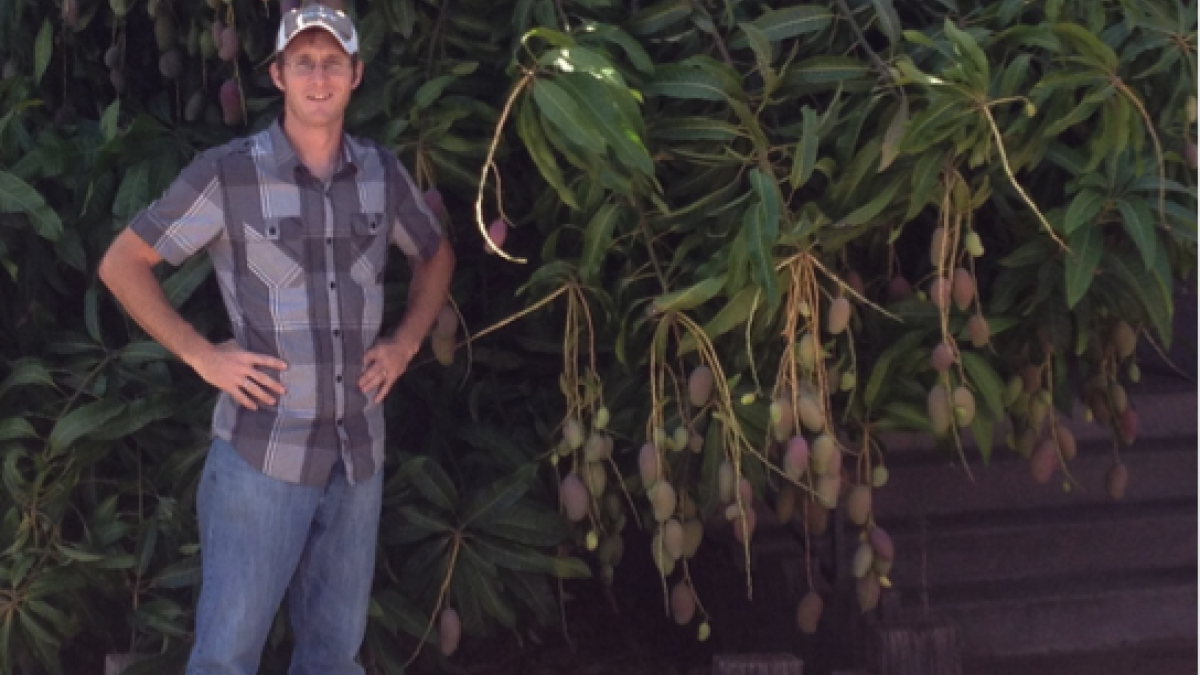Passion for environment turns into sustainability major for ASU student

Sustainability student Jason Tibbets stands next to a full-size mango tree in Mesa.
Name: Jason Tibbetts
Major, school/college: BS in Sustainability, Energy, Materials and Technology Track, School of Sustainability
Hometown: Mesa, Arizona
Question: What was your “aha” moment, when you realized you wanted to study the field you majored in? (Might be while you were at ASU or earlier.)
Answer: I have always had a passion for the environment and self-sufficiency, but I never had a name for it until I heard about the sustainability program at ASU ... I grew up going camping every summer with my family and going on scout campouts every month. I thought that I would own a farm someday, maybe in the woods somewhere (and it may still happen), but I also wanted to change the world through teaching others. I own a business teaching gardening classes, doing edible landscape design and consulting and really feel like it can be a big solution to many of the current environmental, societal and economic problems in the world today.
Q: What’s something you learned while at ASU — in the classroom or otherwise — that surprised you, that changed your perspective?
A: It's hard to choose just one thing that I have gained from ASU that I feel is the most important contributor to my success, but I would say that being willing to take the required classes that I may not feel are quite applicable to me and learn as much as I can from each one. I sit up front and try to take every subject and see how I can apply it in my own life. I feel that this has been such a great benefit to me. I have been able to learn more completely the concept of systems thinking, scenario planning, and many other concepts that are so crucial to effectively implementing sustainability strategies.
Q: Why did you choose ASU?
A: I originally planned on attending an out-of-state school, but I decided to attend Mesa Community College because the school was the top community college in the country and it was conveniently located in my hometown. While at MCC I learned of ASU’s sustainability program and recognized that I had the opportunity to attend the best sustainability program in the nation, which was also right in my backyard.
Q: What’s the best piece of advice you’d give to those still in school?
A: I would tell any student at ASU that the most important thing they can learn at school is not what they learn in a classroom, but what happens when they find their own passion. Living a world with purpose is an entirely different experience than just going to school to get a piece of paper so that someone else can determine your value. You determine the value that you will contribute to the world. It's up to you.
Q: What are your plans after graduation?
A: I hope to continue developing my professional networks and professional knowledge and continue to maintain my relationships with people from ASU. I am currently working part time as a research assistant for professor Scott Cloutier, as a research manager for Agriscaping Technologies, running my own business (Eden Institute LLC) to support a family (wife and three kids) all while going to school full-time. I'm definitely very busy, but it’s pretty awesome! I also want to be a community educator teaching people how to support themselves by developing the resources that they have. It's not just my passion, its my mission and I feel that I am part of a movement. I also want to start a backyard gardening foundation in which economically disadvantaged people can acquire the necessary materials to make their own beautiful, productive landscapes. (I don't have the details worked out yet.)
Q: What does “sustainability” mean to you?
A: I am often asked what a degree in sustainability is. After much thought I have concluded that a degree in sustainability is a degree in complex environmental problem solving. Sustainability is being able to not just survive but create environments where everyone can thrive. Understanding that we all play a part in solving these complex problems is crucial. We each have a mission to fulfill.

